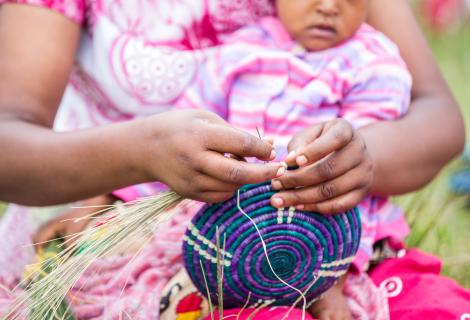
This report exposes the devastating impact public sector cuts are having on women in low income countries, who face a triple threat of losing access to services, having fewer opportunities to access decent work and being forced to take on the rising burden of unpaid care work.
The Care Contradiction: The IMF, Gender and Austerity highlights the ways in which the International Monetary Fund’s policy advice around austerity, and massive cuts to public spending, are exacerbating gender inequality. It draws on recent research that found that 85% of the world’s population will be living in the grips of stringent austerity measures by next year. Austerity measures include cutting or freezing the wages and numbers of teachers, health workers and other public sector workers. The drive to cut public budgets and public sector wage bills has been going on for decades, but the report shows these policies have no credible evidence base. Their effects though are devastating, blocking recruitment of nurses, care workers, doctors and teachers in many countries, even where there are desperate shortages, and blocking pay increases even where workers are on very low pay.
This has undermined health and education outcomes, especially in low and middle income countries. It is estimated that globally, there is a shortage of 5.9 million nurses. In Ghana, our research found that on average there is one doctor to every 8,000 people. This is hugely impacting women, depriving them of health care and opportunities for decent work.
The report also outlines the failings of the IMF’s Gender Mainstreaming Strategy which was launched in July 2022, and identifies the necessary steps needed to turn the tide for women everywhere. The report calls for the IMF to:
- Recognise the negative impact of public wage bill constraints and austerity more broadly on public services provision and women’s labour force participation.
- Commit to support countries to expand the percentage of GDP spent on wage bills wherever essential services are struggling through staff shortages.
- Assess critically the gendered and inequality impact of its austerity policies.
- Consult consistently with national and regional women’s rights organisations, feminist economists and movements in the Global South.
In the end the report joins feminist movements and women’s rights organisations in rejecting the IMF’s Gender Mainstreaming Strategy as it is a perfect example of ‘pink washing’. The organisation is completely ignoring how its current policies are exacerbating gender inequality. Compensatory actions, like targeting social protection at some women after the damage is done by austerity policies, are not enough when the IMF has the power to prevent the harm being done in the first place.
As an alternative The Care Contradiction lays out a bigger vision of a feminist, just alternative to the cult of austerity and an agenda that builds economies and societies based on care. This means moving beyond GDP growth to put human rights and care at the centre of economic objectives and indicators.